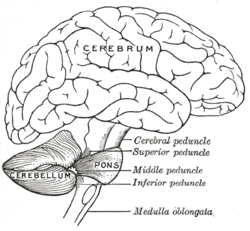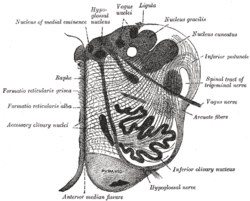| Inferior cerebellar peduncle | |
|---|---|
 Scheme showing the connections of the several parts of the brain. (Inferior peduncle labeled at bottom right.) | |
 Section of the medulla oblongata at about the middle of the olive. (Inferior peduncle labeled at upper right. | |
| Details | |
| Identifiers | |
| Latin | pedunculus cerebellaris inferior |
| NeuroNames | 781 |
| NeuroLex ID | birnlex_1691 |
| TA98 | A14.1.04.013 A14.1.07.413 |
| TA2 | 5850 |
| FMA | 72615 |
| Anatomical terms of neuroanatomy | |
The inferior cerebellar peduncle is formed by fibers of the restiform body that join with fibers from the much smaller juxtarestiform body.[1] The inferior cerebellar peduncle is the smallest of the three cerebellar peduncles.
The upper part of the posterior district of the medulla oblongata is occupied by the inferior cerebellar peduncle, a thick rope-like strand situated between the lower part of the fourth ventricle and the roots of the glossopharyngeal and vagus nerves.
Each cerebellar inferior peduncle connects the spinal cord and medulla oblongata with the cerebellum, and comprises the juxtarestiform body and restiform body.
Important fibers running through the inferior cerebellar peduncle include the dorsal spinocerebellar tract and axons from the inferior olivary nucleus, among others.
- ^ Haines, Duane (2018). Fundamental neuroscience for basic and clinical applications (Fifth ed.). Philadelphia, PA: Elsevier. pp. 161–164. ISBN 9780323396325.